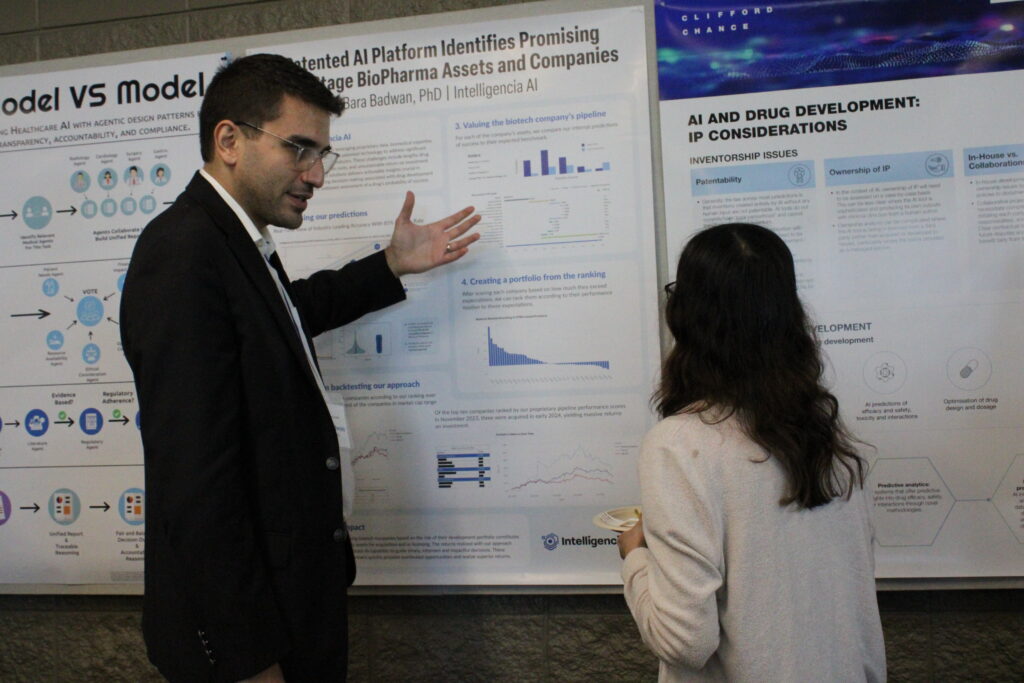Author: Bara Badwan, Senior Data Scientist, Intelligencia AI

I had the opportunity to attend the 2024 Alliance for Artificial Intelligence in Healthcare (AAIH) Conference and present our work on using AI to accurately predict promising biotechs and drug assets early and with greater confidence.
This conference brought together experts from the healthcare, biotech and AI sectors to explore how artificial intelligence (AI) has and will continue transforming healthcare. From drug discovery to optimizing clinical workflows, the potential of AI was evident in various discussions.
1. AI’s Growing Role in Drug Discovery and Biotech
AI is making significant strides in drug discovery. Collaborations between major pharma companies like Genentech and AI innovators such as NVIDIA and Recursion are pushing the boundaries of research. In her keynote, Genentech CEO Ashley Magargee noted, “Even just in your own body, you have trillions of cells and thousands of genes, making genomic combinations mind-boggling. AI is helping us navigate that complexity.” AI’s massive computational power can identify new therapeutic pathways and molecules, making it an indispensable tool in modern drug discovery.
2. AI’s Resource-Saving Impact on Clinical Trials
Session speakers highlighted AI’s potential to reduce clinical trial costs and enhance efficiency. Thanks to AI, we’re already seeing massive cost reductions in clinical trials, and it’s only the beginning. In an AWS talk, Dan Sheeran showed how AI could slash protocol design costs by up to 80%, a game-changer given that ZS estimates that clinical trials account for 70% of R&D expenses.
3. The Reality of Digital Twins in Medicine
The concept of digital twins—virtual models of patients that simulate real-time responses to treatments—is no longer a futuristic concept but an emerging reality. This technology allows for highly personalized treatment planning, further driving the promise of precision medicine.
4. Seamless Integration of AI Into Healthcare Workflows
For AI to be adopted effectively, it must fit seamlessly into healthcare workflows without requiring extensive retraining. The solutions that work best are the ones that don’t force doctors to change their existing processes. Efficient adoption is especially critical in an industry where time is scarce, and maintaining focus on patient care is essential. AI-driven tools that support physicians, such as those that help generate clinical notes during consultations, were frequently discussed as a valuable solution to reduce administrative burdens.
5. AI Reduces the Administrative Burden
AI is streamlining back-office functions in hospitals, reducing the burden on administrative staff. AI tools can tackle tasks like insurance claims and billing, which frees up resources and time. As AI systems can automatically handle repetitive tasks such as responding to insurance denials, this improves efficiency and ensures healthcare providers receive accurate and prompt payment for their services.
6. Tapping AI’s Speed and Accuracy in Radiology and Diagnostics
When it comes to one of the leading areas for AI adoption, radiology tops the list, with tools improving diagnostic speed and accuracy. AI could cut emergency CT scan turnaround time from 42 minutes to 23 minutes. AI’s ability to rapidly analyze images and flag abnormalities has made it an invaluable tool in diagnostics, especially in time-critical situations like stroke detection.
7. Shifting From Reactive to Proactive Healthcare
Looking ahead, AI is poised to shift healthcare from reactive sick care to a more proactive, continuous approach. “AI will help move us from sick care to health care, where we’re not just treating disease after it happens but preventing it in the first place,” said one participant. AI’s ability to monitor patients in real-time, predict potential health issues, and provide personalized treatment plans is a key driver behind this shift.
Conclusion: The Path Forward for AI in Healthcare
The 2024 AAIH conference clearly illustrated AI’s transformative potential in all facets of healthcare. From reducing costs in clinical trials to revolutionizing personalized medicine and alleviating administrative burdens, AI is an integral part of the healthcare system. However, to fully realize its potential, there must be a concerted effort to integrate AI into existing workflows, ensure proper regulation and governance, and train the workforce to embrace these new tools.
As the industry moves forward, combining AI’s power and human expertise will further empower us to create a more efficient, personalized and proactive healthcare system for patients, providers and other healthcare stakeholders.
